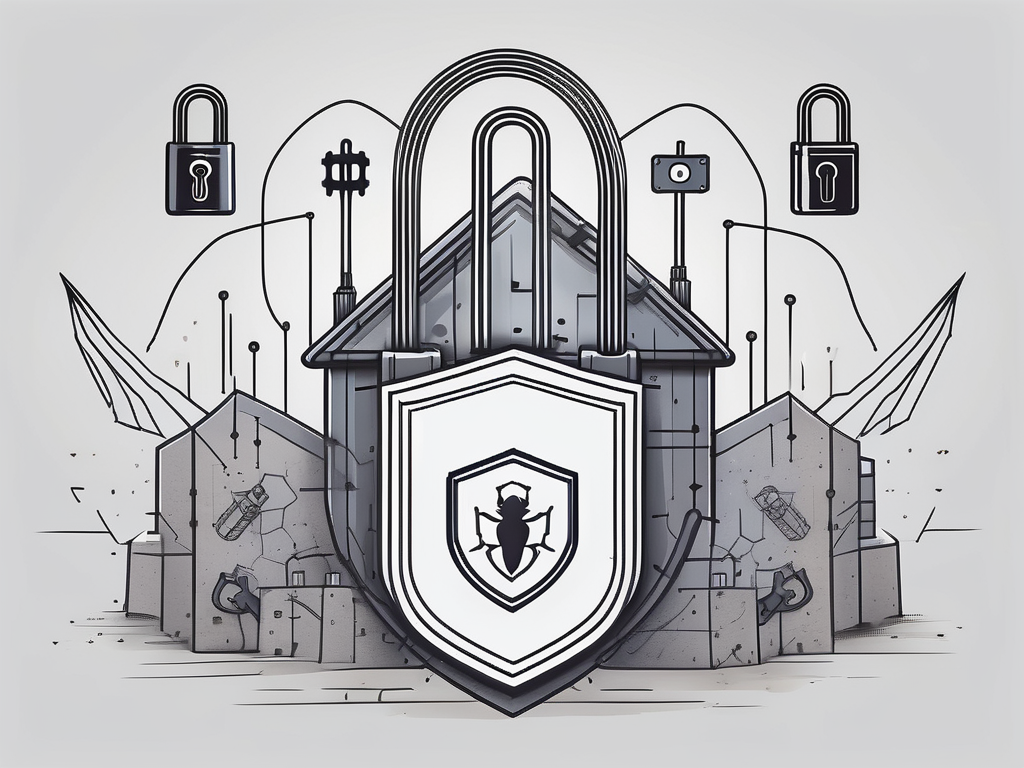
Learn effective strategies to protect your Shopify store from cyber threats with our comprehensive guide.
Running an e-commerce store can be an exciting adventure, but it also comes with its fair share of risks, especially when it comes to cyber threats. In today's digital world, where hackers are constantly evolving and finding new ways to exploit vulnerabilities, it's essential to take proactive measures to protect your Shopify store and secure your customers' data. In this article, we will explore various strategies and best practices to help you safeguard your online business from cyber threats.
Understanding Common Cyber Threats to E-commerce Websites
Cyber threats come in various forms, from phishing attacks and malware infections to DDoS attacks and SQL injections. Understanding these threats is the first step towards defending your Shopify store. Phishing attacks, for example, often rely on social engineering techniques to deceive customers into sharing their sensitive information. Malware infections, on the other hand, can compromise your store's security and compromise your customers' data. By familiarizing yourself with these threats, you'll be better equipped to mitigate them.
DDoS attacks, short for Distributed Denial of Service attacks, are another common threat faced by e-commerce websites. These attacks flood a website with an overwhelming amount of traffic, causing it to slow down or even crash. Cybercriminals often use botnets to orchestrate these attacks, making it challenging for businesses to distinguish legitimate traffic from malicious requests. Implementing robust DDoS protection measures can help safeguard your online store from such disruptions.
SQL injections represent yet another significant risk to e-commerce websites. These attacks occur when malicious actors exploit vulnerabilities in a website's database by inserting malicious SQL code. This can lead to unauthorized access to sensitive data, such as customer information and payment details. Regularly updating your website's software and employing secure-coding practices can help prevent SQL injection attacks and ensure the integrity of your e-commerce platform.
Assessing the Vulnerabilities of Your Shopify Store
Before implementing any security measures, it's crucial to assess the vulnerabilities of your Shopify store. Conduct regular security audits to identify potential weaknesses and address them promptly. Look out for outdated software, weak authentication methods, and any other security gaps that could be exploited by cybercriminals. By understanding your store's vulnerabilities, you can prioritize your security efforts and invest in the right solutions.
One common vulnerability that many Shopify store owners overlook is the risk posed by third-party apps. While these apps can add valuable functionalities to your store, they can also introduce security risks if not properly vetted. It's essential to review the permissions granted to each app and ensure they adhere to best security practices. Additionally, regularly monitor app updates and security patches to stay protected against any newly discovered vulnerabilities.
Furthermore, another critical aspect to consider when assessing your store's vulnerabilities is the handling of customer data. Ensure that sensitive information such as payment details and personal data is encrypted both in transit and at rest. Implementing robust data protection measures not only safeguards your customers' information but also helps you comply with data protection regulations, building trust and loyalty among your clientele.
Implementing Secure Authentication Methods
One effective way to strengthen your Shopify store's security is by implementing secure authentication methods. Enforce strong passwords and consider implementing two-factor authentication (2FA) to add an extra layer of protection. By requiring users to provide a unique code or token in addition to their password, you can significantly reduce the risk of unauthorized access to your store.
Another crucial aspect of secure authentication is the use of biometric authentication methods. Biometric authentication utilizes unique physical characteristics such as fingerprints, facial recognition, or iris scans to verify a user's identity. This advanced technology adds an unparalleled level of security to your store by ensuring that only authorized individuals can access sensitive information.
Furthermore, it is essential to regularly update and patch your authentication systems to protect against emerging security threats. By staying informed about the latest security vulnerabilities and promptly applying patches and updates, you can mitigate the risk of potential breaches and keep your Shopify store secure.
Securing Payment Transactions on Shopify
Securing payment transactions is crucial for the success and trustworthiness of any e-commerce store. One of the key steps to ensure the security of payment transactions on your Shopify store is to comply with the Payment Card Industry Data Security Standard (PCI DSS) requirements. This standard is designed to help businesses process card payments securely and reduce card fraud. By adhering to these requirements, you demonstrate your commitment to protecting your customers' sensitive payment information.
In addition to PCI DSS compliance, it is essential to use secure payment gateways on your Shopify store. Secure payment gateways encrypt customer payment information, making it unreadable to unauthorized parties. This encryption ensures that sensitive data is transmitted securely between the customer, your store, and the payment processor. By utilizing reputable and secure payment gateways, you add an extra layer of protection to your payment transactions.
Enhancing Data Encryption to Protect Customer Information
Data encryption is a critical component of any comprehensive cybersecurity strategy. Ensure that all sensitive customer information is protected through strong encryption methods. Use Secure Sockets Layer (SSL) certificates to establish secure connections between your store and your customers' browsers. By encrypting data both in transit and at rest, you can safeguard your customers' personal information from being intercepted or accessed by unauthorized individuals.
Implementing a robust encryption protocol not only protects your customers' data but also helps build trust and credibility with your audience. When customers see that you prioritize their privacy and security, they are more likely to feel confident in sharing their information with your business. This can lead to increased customer loyalty and positive word-of-mouth recommendations, ultimately benefiting your brand reputation.
Furthermore, staying updated on the latest encryption technologies and best practices is essential in maintaining a secure online environment. Regularly reviewing and enhancing your encryption methods can help stay ahead of potential cyber threats and ensure that your customers' data remains safe. Consider investing in encryption tools that offer end-to-end protection and regularly conduct security audits to identify any vulnerabilities in your system.
Monitoring and Detecting Suspicious Activities
Actively monitor your Shopify store to identify and mitigate any suspicious activities. Implement a robust intrusion detection system (IDS) that alerts you of potential security breaches. Regularly review your logs and monitor user activities to detect any signs of unauthorized access or unusual behavior. By being proactive and responsive to potential threats, you can prevent major security incidents before they occur.
Furthermore, consider setting up real-time alerts for specific triggers that may indicate malicious activities, such as multiple failed login attempts or sudden spikes in traffic from unknown sources. These alerts can help you take immediate action to investigate and address any potential security threats swiftly. Additionally, conducting regular security audits and penetration testing can help uncover vulnerabilities that could be exploited by attackers.
It's also essential to educate your team members about cybersecurity best practices and the importance of maintaining strong password hygiene. Encourage the use of unique, complex passwords and enable two-factor authentication wherever possible to add an extra layer of security to your Shopify store. Remember, cybersecurity is an ongoing process, and staying vigilant is key to safeguarding your e-commerce business from evolving threats.
Creating a Response Plan for Cyber Attacks
Despite your best efforts, it's essential to acknowledge that cybersecurity incidents can still occur. Therefore, it's crucial to have a well-defined response plan in place. Identify the key stakeholders and their roles in the event of a cyber attack. Establish communication channels and steps to contain the attack, recover your data, and notify affected customers promptly. By having a clear response plan, you can minimize the impact of an attack on your store and your customers.
Regularly Updating and Patching Your Shopify Store
Keeping your Shopify store and all its components up to date is vital for maintaining robust security. Regularly check for updates for your theme, plugins, and any other extensions you use. These updates often include security patches that address known vulnerabilities. By promptly applying these updates, you can minimize the risk of exploitation by cybercriminals.
Educating Your Team on Cybersecurity Best Practices
Cybersecurity is a collective effort that involves your entire team. Educate your employees about cybersecurity best practices, including how to identify phishing attempts, avoid suspicious websites, and create strong passwords. Encourage them to report any security concerns promptly. By fostering a security-conscious culture within your organization, you can significantly mitigate the risk of cyber threats.
Utilizing Third-Party Security Apps for Added Protection
In addition to the built-in security features offered by Shopify, consider utilizing third-party security apps to further enhance your store's protection. These apps can add additional layers of security, such as firewall protection, malware scanning, and real-time threat intelligence. Research and select reputable security apps that align with your specific needs and requirements.
Securing your Shopify store against cyber threats requires a multifaceted approach. By understanding common threats, assessing vulnerabilities, implementing secure authentication methods, securing payment transactions, enhancing data encryption, monitoring suspicious activities, creating a response plan, updating your store regularly, educating your team, and utilizing third-party security apps, you can greatly reduce the risk of cyber attacks and protect your customers' data. Remember, cybersecurity is an ongoing process, so regularly review and adapt your security measures to keep pace with the ever-evolving cyber threat landscape.











